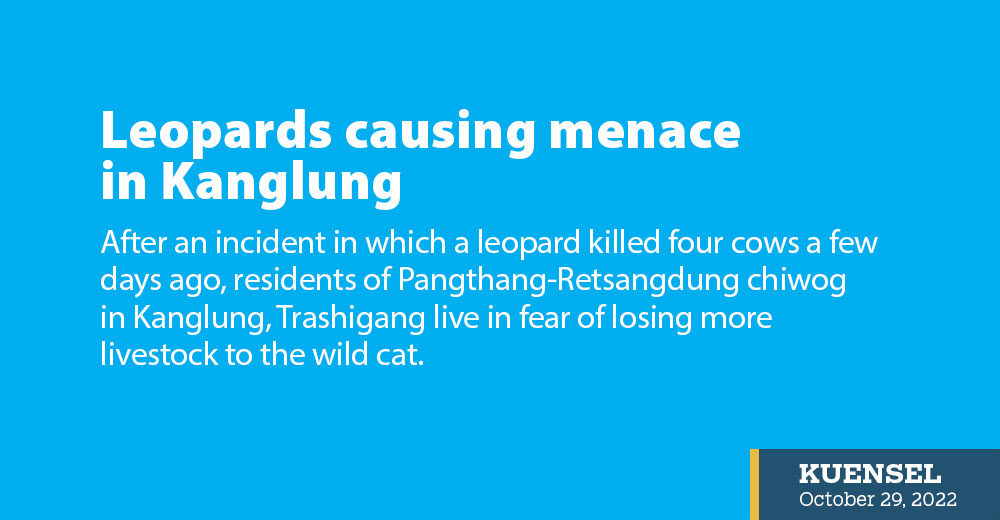… locals say they live in constant conflict with leopards and other wild animals
Neten Dorji | Kanglung
After an incident in which a leopard killed four cows a few days ago, residents of Pangthang-Retsangdung chiwog in Kanglung, Trashigang live in fear of losing more livestock to the wild cat.
The latest incident occurred on the night of October 19, during which a leopard attacked the cowshed of Dubthob Wangdi, a villager of Retsangdung and killed four cattle.
He lost two jersey cows and calves to the leopard. It was not the first time he lost cattle to leopards. Leopards killed two of his oxen on different occasions.
“This is not the first incident of leopards coming to our village and killing cattle. There were many similar cases. This year alone, I lost six cattle to leopards,” he said. “We are worried that leopards might harm even people.”
Dubthop and his family mainly depend on livestock. He didn’t report the incidents in the past. “Today, I have to report to the forest division since I lost four cattle at the same spot,” he said. “I am not sure whether I would receive compensation for my cattle or not.”
He said that he suspects two leopards have killed his cattle at the cowshed.
It’s not only Dubthob Wangdi who lost cattle to leopards but also his neighbours. Another villager, Ugyen Thinley, 45, said that his cattle were sent to graze nearby forest and were killed there. “Till now I have lost about 15 cattle to leopards,” he said. “We cannot control the menace at the local level rather than taking care of ourselves.”
Locals say that they are afraid to go to the forest for fodder and firewood even during the day due to frequent attraction to domestic animals by leopards.
“The increasing number of wild animals in the area has made life difficult for those living in the lower parts of Retsangdung. Humans are also not safe as wild animals roam the settlements day and night,” an elderly woman, Moenlam said.
“We are afraid that it might attack humans, especially while going to the forest for firewood and fodder,” she said.
Residents said that if the situation continues, they have to retaliate against the wild animals even if it is illegal.
“Humans are not allowed to kill any wild animals because it is illegal. But now people are finding it unsafe and wild animals have destroyed crops and domestic animals. So how will we survive if we cannot grow food? And also we are not allowed to fight back,” said an elderly villager.
Pangthang-Retsangdung Tshogpa Ngawang Choden said that with the increase in the number of fallow lands in the villages, the cases of human-wildlife conflicts have risen.
“The thicket and bushes near the settlements attract predators, damaging domestic animals, crops and vegetables,” she said. “There has been no attack on humans so far but wild animals entered our houses and killed many cattle. I am not sure for how long humans are safe.”
She said that compared to the past decades, wild animal attractions have increased in the chiwog.
Villagers said that maybe the animals come to villages in search of food. “I lost my cattle to wild animals in the past. But the authorities concerned ignore our problem in the name of protecting wild animals,” he added.
Officials from Trashigang Forest Division said that the case has been reached to the division and the report would be forwarded to the Nature Conservation Division.
“It seems the same family that killed the cattle at Trashigang Pam and Samkhar. We tried to translocate the leopards but we could not do it,” said an official.“It would be better if farmers could insure their livestock where the government can compensate later.”
He said that the Trashigang forest division has given a budget of Nu 1.2 million to the dzongkhag administration to curb the human-wildlife conflicts in the dzongkhag.


